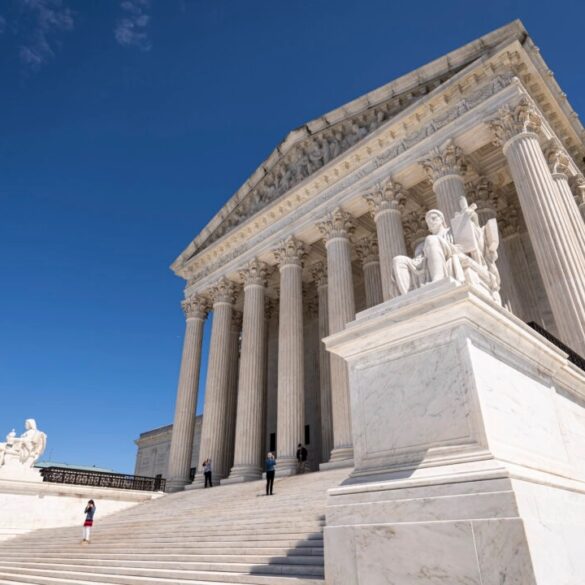Justices issue new directive.

The U.S. Supreme Court on April 23 directed the U.S. Department of Justice to reply to a man convicted in the Jan. 6, 2021, breach of the U.S. Capitol.
Justices said the department’s response to Russell Alford is due May 23.
Mr. Alford was convicted by a jury of four misdemeanor counts but is challenging two of the charges, arguing that they don’t apply to his conduct.
The charges should not have been brought because the laws on which they’re based bar disorderly and disruptive conduct in a Capitol building and in a restricted building, but Mr. Alford merely entered the Capitol and stood silently against a wall before exiting, the Supreme Court was told in a filing from Mr. Alford’s lawyers.
U.S. District Judge Tonya Chutkan, an appointee of President Barack Obama, originally rejected Mr. Alford’s request to dismiss the counts, finding that his “mere presence inside the Capitol disturbed the public peace or undermined public safety.”
A federal appeals court, after reviewing the rejection, upheld it in January. While Mr. Alford was “neither violent nor destructive … a jury could rationally find that his unauthorized presence in the Capitol as part of an unruly mob contributed to the disruption of the Congress’s electoral certification and jeopardized public safety,” the ruling stated.
“The court should grant review because this case presents an important question of federal statutory interpretation,” Mr. Alford’s lawyers wrote to the Supreme Court, describing the appeals court ruling as “establish[ing] a slippery and counter-textual standard for criminalizing conduct in settings for political activity.”
One of the laws, 18 U.S.C. § 1752(a)(2), bars people from “knowingly, and with intent to impede or disrupt the orderly conduct of government business or official functions, engages in disorderly or disruptive conduct in, or within such proximity to, any restricted building or grounds when, or so that, such conduct, in fact, impedes or disrupts the orderly conduct of government business or official functions.”
The other, 40 U.S.C. § 5104(e)(2)(D), makes it a crime to “utter loud, threatening, or abusive language, or engage in disorderly or disruptive conduct, at any place in the grounds or in any of the Capitol Buildings with the intent to impede, disrupt, or disturb the orderly conduct of a session of Congress or either house of Congress, or the orderly conduct in that building of a hearing before, or any deliberations of, a committee of Congress or either house of Congress.”
The lower court rulings were wrong in part because they focused on the effects of Mr. Alford’s conduct, not the nature of the conduct, according to the writ to justices.
That focus “collapses the conduct element into the harm element by giving the adjectives no apparent force,” they said. They argued later that merely being present “is not disorderly conduct unless the presence is in defiance of an order to disperse.”
If the court grants the petition, it would review the case and decide if the rulings were appropriate.
The Department of Justice’s Solicitor General, Elizabeth Prelogar, told the court on April 12 that the government was waiving its right to file a response to the filing, “unless requested to do so by the court.” The petition was distributed to justices on April 18 for their scheduled May 9 conference. Then, on Tuesday, justices directed the Department of Justice to file a response to Mr. Alford.
Lawyers for Mr. Alford and the government did not respond to requests for comment.
If justices take up the petition and rule in favor of Mr. Alford, a number of other Jan. 6 defendants and convicts could see charges thrown out.
Obstruction Charge
The court already agreed to review another charge brought against many Jan. 6 defendants.
Justices sat for oral arguments on April 16 concerning obstruction of an official proceeding, a charge brought against former police officer Joseph Fischer after he entered the Capitol on Jan. 6.
One of Mr. Fischer’s attorneys said the charge should not have been brought because the law was only intended to be used in cases of evidence tampering.
Ms. Prelogar told justices that the charge was proper because it was “not limited to evidence impairment.”
Justice Neil Gorsuch, appointed by former President Donald Trump, wondered whether the government would bring the charge against people who heckled the court.
“Would a sit-in that disrupts a trial or access to a federal courthouse qualify? Would a heckler in today’s audience qualify, or at the State of the Union address? Would pulling a fire alarm before a vote qualify for 20 years in federal prison?” he asked.
Another justice later questioned if protesters blocking access to a trial would face the charge, noting that protests have taken place in the past at the Supreme Court but the government did not charge the protesters under the law.
Ms. Prelogar said the law might apply in such cases, if there was proof of “corrupt intent.”
Justices are due to hand down a decision in the case at some point in the future.
